Author Archive
Tuesday, March 22nd, 2011
Homeowners in North Carolina facing foreclosure can receive free legal advice at a public forum, “Community Education Day: What to do When Facing Mortgage Issues,” on Saturday, March 26, at 10 a.m. in the Turner Law Building on the campus of North Carolina Central University. The event is free and open to the public and is part of the NCCU School of Law Foreclosure Prevention Project in partnership with Legal Aid of North Carolina.
“This event is for people who are facing foreclosure, who have questions about their mortgage or are seeking information about loan modification programs,” said Timothy Peterkin, legal writing professor and director of the NCCU Foreclosure Prevention Project. “We are excited to have the opportunity to serve North Carolina’s citizens in this manner. NCCU Law has students working to prevent foreclosure through a hands-on approach.”
The forum will offer individual meetings with foreclosure defense attorneys, information sessions on foreclosure prevention, explanations of government programs that assist homeowners in foreclosure and various foreclosure prevention strategies. Attendees should bring all foreclosure and loan documents to assist the attorneys reviewing cases.
Appointments are encouraged but not required. To schedule an appointment with an attorney or to attend the forum, call (919) 530-6079.
The North Carolina Central University School of Law is home to an award-winning, nationally ranked clinical legal education program. The clinic operates from a model law office that provides a professional atmosphere for clients. As one of the most comprehensive programs in the Southeast, the legal clinic offers law students a clinical experience that suits their professional goals. Professors supervise the live-client clinics and also teach the skills courses that are critical to advocacy. Eleven clinics are offered: Dispute Resolution, Civil Litigation, Criminal Defense, Criminal Prosecution, Domestic Violence, Family Law, Juvenile Law, Pro Bono, Small Business, Street Law and Veterans Law.
Posted in Public Affairs | 9 Comments »
Wednesday, March 16th, 2011
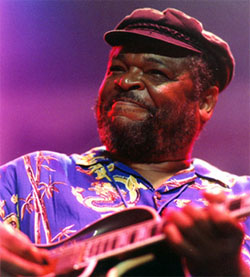 Melvin Sparks, a much-in-demand soul-jazz guitarist who recorded with virtually all of the great organists of the late ’60s and ’70s and pioneered a sound that borrowed from Grant Green and Sly Stone, died on March 13 . He was 64. Melvin Sparks, a much-in-demand soul-jazz guitarist who recorded with virtually all of the great organists of the late ’60s and ’70s and pioneered a sound that borrowed from Grant Green and Sly Stone, died on March 13 . He was 64.
Sparks was at his best playing a muscular, groovy rhythm guitar behind organists like Leon Spencer and Charles Earland, breaking out occasionally with a melodic, groovy solo. He was a mainstay at Prestige during the ’70s, where he was a first-call session guitarist noted for his pulsating twangy feel.
Two of my favorite albums featuring Sparks are Leon Spencer’s Louisiana Slim (1971) and Charles Earland’s Infant Eyes (1978).
Here’s Leon Spencer on Mercy, Mercy Me with Sparks keeping jazz-soul time.
And here’s Charles Earland’s Thang from 1978 off of Infant Eyes, with Sparks running a string-bending solo. Also on the date: Bill Hardman (tp), Frank Wess (fl,ts), Mack Goldsbury Melvin Sparks, Grady Tate (d) and Lawrence Killian (perc).
Posted in Music News | 3 Comments »
Tuesday, March 15th, 2011
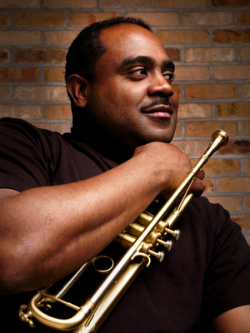 The composer Billy Strayhorn was responsible for some of the most exquisite melodies in the history of jazz. You’ve surely heard some of his tunes, if not necessarily his name: He mostly wrote them for the Duke Ellington Orchestra. The composer Billy Strayhorn was responsible for some of the most exquisite melodies in the history of jazz. You’ve surely heard some of his tunes, if not necessarily his name: He mostly wrote them for the Duke Ellington Orchestra.
Jazz musicians know of his genius, though. The trumpeter Terell Stafford certainly does; his upcoming album This Side of Strayhorn interprets nine Strayhorn tunes as straight-ahead jazz, circa 2011. He and his quintet will celebrate the release of this recording live at the Village Vanguard in New York, and WBGO and NPR Music will be on hand on opening night for a live audio/video broadcast and webcast on Tuesday, March 15 at 9 p.m. ET. This page will host the audio/video feed, a live chat and archived recording.
This Side of Strayhorn largely features Strayhorn’s more celebrated tunes — “Lush Life,” “Day Dream,” etc. — in a plainspoken, tasteful style. Stafford’s band, however, has also workshopped a number of lesser-known tunes, which will hopefully crop up in performance. Pianist Bruce Barth had an important hand in these arrangements; he’s part of Stafford’s regular cast, which also includes the busy Peter Washington on bass, Tim Warfield on saxophones (coming in from rural Pennsylvania) and Dana Hall on drums (coming in from Chicago).
Stafford came to the jazz forefront the time-honored way — by spending valuable time as an apprentice in bands of veteran bandleaders like Bobby Watson and McCoy Tyner. Most of his gigs still come as a sideman; when you can play in almost every setting on both trumpet and flugelhorn, you get phone calls. He also directs the jazz program and teaches at Temple University in Philadelphia. But he’s carved out time for his working band, and there’s a document to prove it. In 2005, a nearly identical ensemble to the one appearing here recorded Stafford’s previous album, the live CD Taking Chances. (In 2009, another nearly identical ensemble recorded Hall’s debut as a leader, Into the Light.)
Terell Stafford plays in the Vanguard Jazz Orchestra, the big band in residence at the club on Monday nights, so he’s no stranger to the venerated venue. But starting on March 15, he gets to move up from the back row for a week.
Posted in Music News | 21 Comments »
Monday, March 14th, 2011
Dr. Freddie L. Parker, professor, former chair and current interim chair of the History Department at North Carolina Central University, has been appointed chairman of the state’s African-American Heritage Commission by Governor Bev Perdue.
Parker joined the commission when it was created two years ago. Established by the North Carolina General Assembly in 2008, the commission advises and assists the state Secretary of Cultural Resources in the preservation, interpretation and promotion of African-American history, arts and culture. Parker replaces Harry Harrison of Asheville.
“We are delighted to have Dr. Parker take on this important leadership role for the commission and for the people of North Carolina, as we are in a critical and exciting stage of development,” said Michelle Lanier, acting director of the commission.
It is the first panel in North Carolina dedicated to African-American heritage and history. The commission’s duties, established in the legislation, include:
- Promoting public awareness of historic buildings, sites, structures, artwork and culture associated with African-American heritage through special programs, exhibits and publications;
- Supporting African-American heritage education in elementary and secondary schools in coordination with state’s public schools;
- Building a statewide network of individuals and groups interested in the preservation of African-American history, arts and culture; and
- Developing a program to catalog, preserve, assess and interpret all aspects of African-American history, arts and culture.
An NCCU alumnus, Parker has lent his time to a number of organizations related to history. He is past chairman of the North Carolina Historical Highway Marker Commission and currently is chairman of the African American History Project Advisory Board at Tryon Palace in New Bern. Last fall, he was elected vice-president of the Historical Society of North Carolina and will become its president this year.
In January, Parker won entry into the North Caroliniana Society, a nonprofit group that selects as members North Carolinians who meet the strict criterion of “adjudged performance” in service to the state’s heritage.
Parker received bachelor’s and master’s degrees in history from NCCU in 1975 and 1977 respectively, and the Ph.D. in American History from UNC-Chapel Hill in 1987. He is the author of “Running for Freedom: Slave Runaways in NC, 1775-1840,” and “Stealing a Little Freedom: Advertisements for Slave Runaways in NC, 1791-1840.”
The Department of Cultural Resources is the state agency that protects and promotes North Carolina’s arts, heritage and culture.
Posted in Public Affairs | 6 Comments »
Thursday, March 10th, 2011
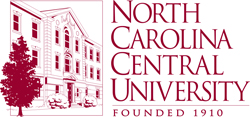 North Carolina Central University will once again compete in the Home Depot 2011 “Retool Your School” competition, which awards grants to historically black colleges and universities. NCCU submitted two projects for consideration: $50,000 to beautify and install an ADA-approved wheelchair ramp in front of the McDougald – McLendon Gymnasium and $10,000 to update one of the campus bowls used by Greek-letter organizations. North Carolina Central University will once again compete in the Home Depot 2011 “Retool Your School” competition, which awards grants to historically black colleges and universities. NCCU submitted two projects for consideration: $50,000 to beautify and install an ADA-approved wheelchair ramp in front of the McDougald – McLendon Gymnasium and $10,000 to update one of the campus bowls used by Greek-letter organizations.
The Retool Your School grant program will award $150,000 in grants, distributed as one $50,000 grand prize and 10 other grants of $10,000 each. The grant supports evergreen campus improvement efforts. Online voting will take place until April 22, and participants can cast a vote for NCCU daily. To vote for NCCU, visit www.homedepot.com/retoolyourschool.
During the online voting period, individuals can view descriptions of major and minor projects and cast one vote per day for their favorite HBCU. After the online vote, a panel of judges will evaluate each school’s proposal. Schools must highlight how each project will have a lasting, positive impact on its campus, and special attention will be given to schools that pitch eco-friendly tasks. The winning schools will be determined based on a combination of online votes and the judges’ evaluations. The Home Depot will announce the top finalists on May 16.
Posted in Public Affairs | Comments Off on Vote for NCCU in the Home Depot “Retool Your School” Contest
Thursday, March 10th, 2011
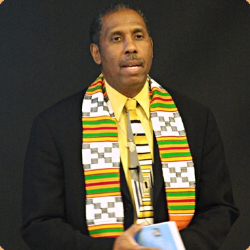 Dr. Jawanza Kunjufu, education consultant and author, will be the keynote speaker at the North Carolina Central University School of Education Symposium on Saturday, March 26, in the H.M. Michaux Jr. School of Education building. The theme of this year’s symposium is “Reigniting the Passion…Redefining Education for Our Children.” Dr. Jawanza Kunjufu, education consultant and author, will be the keynote speaker at the North Carolina Central University School of Education Symposium on Saturday, March 26, in the H.M. Michaux Jr. School of Education building. The theme of this year’s symposium is “Reigniting the Passion…Redefining Education for Our Children.”
A reception and live auction, hosted by Rep. and Mrs. H.M. “Mickey” Michaux, will take place on Friday, March 25 at 6 p.m., with WTVD news reporter Anthony Wilson as the master of ceremonies.
Kunjufu has dedicated his career to addressing the ills afflicting black culture in the United States. The main thrust of his work has been directed toward improving the education and socialization of black youths. He is the founder and president of African American Images, a Chicago-based publishing company that sponsors workshops designed to help educators and parents develop practical solutions to the problems of child-rearing in what he perceives to be a racist society.
Kunjufu has written more than 33 books, including Black Students: Middle Class Teachers; Keeping Black Boys Out of Special Education; An African-Centered Response to Ruby Payne’s Poverty Theory; Raising Black Boys and 200-Plus Educational Strategies to Teach Children of Color. His latest title, Understanding Black Male Learning Styles, is a resource guide for teachers on the challenges minority males face in the classroom.
Since 1974 he has delivered lectures and workshops targeting the problems facing black educators. Recently, he expanded his work to include video and film production. His work has been featured in Ebony and Essence magazines, and he has been a guest on BET and Oprah. He is also a frequent guest on the Michael Baisden show.
Kunjufu attended Illinois State University at Normal and received his bachelor’s degree in economics. He earned a doctorate in business administration at Union Graduate College.
Additional panelists and speakers at the symposium include Kamau Ptah, program coordinator, Sankofa Passages Project, The Coalition of Schools Educating Boys of Color; Alexandra Zagbayou, director of operations, Student U; Dr. Eric Becoats, superintendent, Durham Public Schools; Kristy Moore, president, Durham Association of Educators; Maria Rosa Rangel, senior administrator, LEP (Limited English Proficiency) Family Outreach Services in Wake County, and Leonardo Williams, N.C. Foundation for Public Schools Children.
Cost of the event is $50 for the auction and reception ($25 for students) and $50 for the symposium ($25 for students) or $75 for both the reception and symposium. For more information, call (919) 560-6466. Proceeds from the auction support the Cecelia Steppe-Jones Scholarship. Proceeds from the Education Symposium benefit the SOE Professional Development Fund.
Founded in 1910, North Carolina Central University was the first publicly supported liberal arts college for African-Americans. Today, this dynamic campus has a diverse student body of 8,600 enrolled in academic programs including law, biotechnology, library science, business, nursing, education and the arts. For two years in a row, U.S. News & World Report has ranked NCCU as the best public historically black college or university in the nation.
Posted in Public Affairs | 7 Comments »
Tuesday, March 1st, 2011
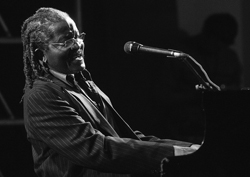 Andrew W. Bey was born October 28, 1939 in Newark, New Jersey. He is a jazz singer and pianist. He worked on a television show, Startime, with Connie Francis and sang for Louis Jordan. He also did notable work with Horace Silver and Gary Bartz. Later he had an album named Experience And Judgment, which had Indian influences. After that period he returned to hard bop and also did covers of music by non-jazz musicians like Nick Drake. Andrew W. Bey was born October 28, 1939 in Newark, New Jersey. He is a jazz singer and pianist. He worked on a television show, Startime, with Connie Francis and sang for Louis Jordan. He also did notable work with Horace Silver and Gary Bartz. Later he had an album named Experience And Judgment, which had Indian influences. After that period he returned to hard bop and also did covers of music by non-jazz musicians like Nick Drake.
One of the great unsung heroes of jazz singing, Andy Bey is a commanding interpreter of lyrics who has a wide vocal range and a big, rich, full voice. Bey was exposed to jazz as a child and started singing in front of local audiences as early as eight. At some gigs, an eight-year-old Bey was accompanied by tenor sax great Hank Mobley. Bey was 13 when, in 1952, he recorded his first solo album, Mama’s Little Boy’s Got the Blues; and he was 17 when he formed Andy & the Bey Sisters with his siblings Salome and Geraldine in 1956. The group did a 16-month tour of Europe and recorded three albums (one for RCA Victor in 1961, two for Prestige in 1964 and 1965) before breaking up in 1967.
In the 1960s and 1970s, Bey’s 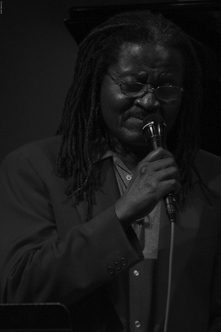 vocals were featured by Max Roach, Duke Pearson, and Gary Bartz . The 1970s also found Bey recording Experience and Judgment for Atlantic and beginning a long association with pianist Horace Silver, who featured him prominently on many of the religious-themed albums he put out own his own Silveto label in the 1970s and 1980s. The LPs contained what Silver termed “metaphysical self-help music” and preached a sort of religious self-help philosophy that wasn’t unlike Reverend Ike’s message — unfortunately for Silver and Bey, this approach meant limited distribution and little commercial appeal. vocals were featured by Max Roach, Duke Pearson, and Gary Bartz . The 1970s also found Bey recording Experience and Judgment for Atlantic and beginning a long association with pianist Horace Silver, who featured him prominently on many of the religious-themed albums he put out own his own Silveto label in the 1970s and 1980s. The LPs contained what Silver termed “metaphysical self-help music” and preached a sort of religious self-help philosophy that wasn’t unlike Reverend Ike’s message — unfortunately for Silver and Bey, this approach meant limited distribution and little commercial appeal.
Bey continued to work with Silver into the 1990s, when he was featured on Silver’s 1993 Columbia date It’s Got to Be Funky (which marked a return to hard bop’s mainstream and did much better commercially than his “self-help music”). Labels Bey recorded for as a leader in the 1980s and 1990s included Jazzette, Zagreb, and Evidence, which, in 1996, released the superb Ballads, Blues and Bey.
Posted in Artist of the Month | 6 Comments »
Saturday, February 26th, 2011
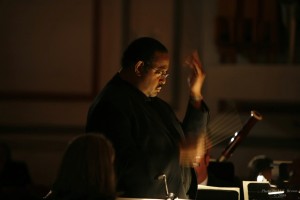 For decades, colleges founded for African-Americans sent their choirs on national tours each year, in hopes that the soaring music would lure high school students to enroll. The practice was revived about two years ago with the enthusiastic support of Chancellor Charlie Nelms. NCCU’s University Choir will start its 12-day tour on March 3, with performances at Greensboro’s Dudley and Smith high schools. For decades, colleges founded for African-Americans sent their choirs on national tours each year, in hopes that the soaring music would lure high school students to enroll. The practice was revived about two years ago with the enthusiastic support of Chancellor Charlie Nelms. NCCU’s University Choir will start its 12-day tour on March 3, with performances at Greensboro’s Dudley and Smith high schools.
Students led by Choir Director Richard Banks will go on to perform in Philadelphia, Detroit, Chicago and Baltimore, among other cities.
“It’s going to be a wonderful extension of the students’ educational experience and outreach for the university,” said Banks. “We are NCCU’s ambassadors.”
In past years, the singers, sometimes referred to as the Touring Choir, performed mostly in the churches of NCCU alumni, who invited the choir and often helped pay its travel expenses. NCCU’s hope was that alumni chapter members in each city would bring high school students from their communities to the performance. Those youngsters would be inspired by the choir and would then seriously consider applying to NCCU.
Recently, that strategy has changed as university officials found that going directly to high schools better targets large numbers of prospective students. “This is the only way to do it,” said Banks. Nelms designated the funding to help finance the tour and a member of the university’s recruitment office will accompany the choir.
The choir still performs at a few churches during the tour. And in some cities, alumni who were University Choir members while at NCCU will sing with the present-day members.
NCCU students will have a chance to see historic sites in Philadelphia and will visit the National Aquarium in Baltimore.
Many of the stops are at www.nccu.edu.
Posted in Public Affairs | 2 Comments »
Tuesday, February 1st, 2011
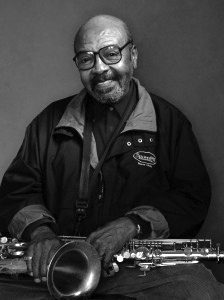 James Moody was born in Savannah, Georgia on March 26, 1925. Growing up in New Jersey, he was attracted to the saxophone after hearing Don Byas and various saxophonists who played with Count Basie. He joined the US Army Air Corps in 1943 and played in the “negro band” on the segregated base. Following his discharge from the military in 1946 he played with Dizzy Gillespie for two years. Moody later played with Gillespie in 1964, where his colleagues in the Gillespie group, pianist Kenny Barron and guitarist Les Spann, would be musical collaborators in the coming decades. James Moody was born in Savannah, Georgia on March 26, 1925. Growing up in New Jersey, he was attracted to the saxophone after hearing Don Byas and various saxophonists who played with Count Basie. He joined the US Army Air Corps in 1943 and played in the “negro band” on the segregated base. Following his discharge from the military in 1946 he played with Dizzy Gillespie for two years. Moody later played with Gillespie in 1964, where his colleagues in the Gillespie group, pianist Kenny Barron and guitarist Les Spann, would be musical collaborators in the coming decades.
In 1948 he recorded his first session for Blue Note Records, the first in a long recording career playing both saxophone and flute. That same year he relocated to Europe, where he stayed for three years, saying he had been “scarred by racism” in the U.S.His European work, including the first recording of “Moody’s Mood for Love” saw him add the alto saxophone to his repertoire and helped to establish him as recording artist in his own right, and were part of the growth of European jazz.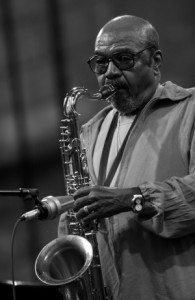
In 1952 he returned to the U.S. to a recording career with the premier jazz label Prestige Records and others, playing flute and saxophone. In the 1960s he rejoined Dizzy Gillespie. He later worked also with Mike Longo.
In a 1998 interview with Bob Bernotas, Moody stated that he believed jazz has definite spiritual resonance.
The James Moody Quartet (with pianist Renee Rosnes, bassist Todd Coolman, and drummer Adam Nussbaum) was Moody’s vehicle later is his career. Moody played regularly with Dizzy Gillespie Alumni All-Stars and the Dizzy Gillespie Alumni All-Stars Big Band and also often collaborated with former Gillespie alumnus, the trumpeter-composer-conductor Jon Faddis.
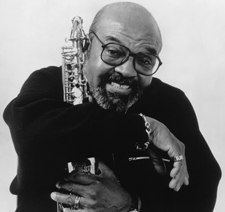 Moody was an NEA Jazz Master and often participated in educational programming and outreach. Moody was an NEA Jazz Master and often participated in educational programming and outreach.
On November 2, 2010, Moody’s wife announced on his behalf that he had pancreatic cancer, and had chosen not to have it treated aggressively. Moody died in San Diego, on December 9, 2010, of complications from pancreatic cancer.
To see more detailed information about Moody, please visit his official website, jamesmoody.com
Posted in Artist of the Month | 5 Comments »
Monday, January 31st, 2011
Slate Includes Thursday Night Season-Opener at Rutgers, Classic in Cleveland, Full MEAC Line-Up
The 2011 North Carolina Central University football schedule, which features five home contests, gives NCCU fans a lot to be excited about this coming season. With a new coaching staff on board, including head coach Henry Frazier III, the Eagles will be competing in their first full Mid-Eastern Athletic Conference (MEAC) schedule with eight total games against conference opponents.
Not only will NCCU have a thrilling first full conference schedule, the Eagles will also have the honor to compete in the NFL Cleveland Browns Stadium in Cleveland, Ohio, where they will participate in the 2011 Cleveland Classic, taking on the Central State University Marauders on Sept. 10.
On Thursday Sept. 1 (7:30 p.m.), the Eagles start their fifth season as a NCAA Division I-FCS competitor against the only NCAA Division I-FBS team on their 2011 schedule, Big East affiliate, Rutgers University. Rutgers finished with a 4-8 overall record in its 2010 season. The Scarlet Knights had their biggest 2010 victory against fellow MEAC member, Norfolk State, with a 30-0 final score.
On Sept. 10 (12 p.m.), NCCU will compete in its fifth NFL stadium in the past decade as the Eagles play the Central State Marauders inside the Cleveland Browns Stadium. This contest will be a rematch from NCCU’s 2009 homecoming and this game will also be the Eagles only Division II opponent of the year. NCCU was victorious in the Oct. 31, 2009 meeting with Central State with a final score of 53-22, and the Eagles now also lead the series against the Marauders, 2-1.
On Sept. 17 (6 p.m.), NCCU will kick off its home competition against highway I-40 foes, Elon University. The last time the Eagles took on the Phoenix, back on Sept. 14, 1996, they were known as the Fighting Christians of Elon College. This game will mark the 11th meeting between the Eagles and the Phoenix, with Elon leading the series 7-3.
A match-up of fresh MEAC faces will take place on Sept. 24 (6 p.m.) at home when the two newest league members, NCCU and Savannah State, battle it out on the gridiron. Fellow newcomer SSU had a bumpy 2010 season with a 1-10 overall record. The Tigers, like the Eagles, are looking to turn things around in 2011 with the welcoming of new head coach Steve Davenport. NCCU has won three out of the last four match-ups with the Tigers.
On Oct. 8 (1:30 p.m.), the Eagles will make the trip down to Orangeburg, S.C., where they will take on the South Carolina State Bulldogs. South Carolina State, which captured the MEAC title in 2008 and 2009, finished second in the league last season with an overall 9-2 record and a 7-1 conference record.
On Oct. 15 (4 p.m.), NCCU will return home for another game to help gain bragging rights in the MEAC when the Eagles take on Morgan State. In the 36th meeting between the Eagles and Bears, Morgan State returns to Durham for the first time in 30 years dating back to Oct. 10, 1981. MSU leads the series with NCCU 21-12-2.
On Oct. 22 (2 p.m.), NCCU hits the road to take the short bus trip to Hampton, Va., to play Hampton University. The Eagles fell to Hampton a year ago 13-27 in Durham, N.C., making them hungry for revenge against the Pirates on their home field in Virginia.
The Eagles will celebrate their Homecoming game on Oct. 29 (2 p.m.) when the NCCU Eagles host reigning MEAC champions, Bethune-Cookman. The Wildcats return to O’Kelly-Riddick Stadium for the second year in a row. In last year’s meeting the Eagles fell short with a final score of 10-23 as they tried to knock down the undefeated Wildcats.
On Nov. 5 (1 p.m.), the Eagles take their play back on the road as the travel north again up to Dover, Del., where they take on Delaware State University. Last year the Eagles struggled against the Hornets where they fell 7-29. NCCU still holds a 13-6 lead in the series with Delaware State.
On Nov. 12 (2 p.m.), the Eagles will return home to honor their 2011 seniors in their “Senior Day” celebration, as they take on the Rattlers of Florida A&M University. Florida A&M finished 8-3 overall, with a MEAC final record of 7-1 in its 2010 slate.
NCCU wraps up its 2011 campaign 60 miles down the road in Greensboro, N.C., on Nov. 19 (1:30 p.m.) against the rival North Carolina A&T Aggies. After two straight years of nail-biting competition between the Eagles and the Aggies, last year’s electrifying match-up was brought back to O’Kelly-Riddick Stadium for the first time since 1992 and the Eagles did not let their sold out crowd down. The Eagles took an early lead on the Aggies and never looked back, defeating their biggest rivals with a final score of 27-16. A&T had a rocky 2010 season finishing up 1-10 overall and 1-7 in MEAC play, although the Aggies still hold a 46-31-5 advantage in the 87-year history of the rivalry against the Eagles.
To watch the Eagles in action during all five home games, season tickets are $130 for reserved seating. Tickets will open up to Eagle Club members from Feb. 14-28 and will be available to the general public on March 1. For more information, visit www.NCCUEaglePride.com or call the NCCU Ticket Office at (919) 530-5170.
Posted in Public Affairs | 14 Comments »
|


 Melvin Sparks, a much-in-demand soul-jazz guitarist who recorded with virtually all of the great organists of the late ’60s and ’70s and pioneered a sound that borrowed from Grant Green and Sly Stone, died on March 13 . He was 64.
Melvin Sparks, a much-in-demand soul-jazz guitarist who recorded with virtually all of the great organists of the late ’60s and ’70s and pioneered a sound that borrowed from Grant Green and Sly Stone, died on March 13 . He was 64. The composer Billy Strayhorn was responsible for some of the most exquisite melodies in the history of jazz. You’ve surely heard some of his tunes, if not necessarily his name: He mostly wrote them for the Duke Ellington Orchestra.
The composer Billy Strayhorn was responsible for some of the most exquisite melodies in the history of jazz. You’ve surely heard some of his tunes, if not necessarily his name: He mostly wrote them for the Duke Ellington Orchestra. North Carolina Central University will once again compete in the Home Depot 2011 “Retool Your School” competition, which awards grants to historically black colleges and universities. NCCU submitted two projects for consideration: $50,000 to beautify and install an ADA-approved wheelchair ramp in front of the McDougald – McLendon Gymnasium and $10,000 to update one of the campus bowls used by Greek-letter organizations.
North Carolina Central University will once again compete in the Home Depot 2011 “Retool Your School” competition, which awards grants to historically black colleges and universities. NCCU submitted two projects for consideration: $50,000 to beautify and install an ADA-approved wheelchair ramp in front of the McDougald – McLendon Gymnasium and $10,000 to update one of the campus bowls used by Greek-letter organizations. Dr. Jawanza Kunjufu, education consultant and author, will be the keynote speaker at the North Carolina Central University School of Education Symposium on Saturday, March 26, in the H.M. Michaux Jr. School of Education building. The theme of this year’s symposium is “Reigniting the Passion…Redefining Education for Our Children.”
Dr. Jawanza Kunjufu, education consultant and author, will be the keynote speaker at the North Carolina Central University School of Education Symposium on Saturday, March 26, in the H.M. Michaux Jr. School of Education building. The theme of this year’s symposium is “Reigniting the Passion…Redefining Education for Our Children.” Andrew W. Bey was born October 28, 1939 in Newark, New Jersey. He is a jazz singer and pianist. He worked on a television show, Startime, with Connie Francis and sang for Louis Jordan. He also did notable work with Horace Silver and Gary Bartz. Later he had an album named Experience And Judgment, which had Indian influences. After that period he returned to hard bop and also did covers of music by non-jazz musicians like Nick Drake.
Andrew W. Bey was born October 28, 1939 in Newark, New Jersey. He is a jazz singer and pianist. He worked on a television show, Startime, with Connie Francis and sang for Louis Jordan. He also did notable work with Horace Silver and Gary Bartz. Later he had an album named Experience And Judgment, which had Indian influences. After that period he returned to hard bop and also did covers of music by non-jazz musicians like Nick Drake. vocals were featured by Max Roach, Duke Pearson, and Gary Bartz . The 1970s also found Bey recording Experience and Judgment for Atlantic and beginning a long association with pianist Horace Silver, who featured him prominently on many of the religious-themed albums he put out own his own Silveto label in the 1970s and 1980s. The LPs contained what Silver termed “metaphysical self-help music” and preached a sort of religious self-help philosophy that wasn’t unlike Reverend Ike’s message — unfortunately for Silver and Bey, this approach meant limited distribution and little commercial appeal.
vocals were featured by Max Roach, Duke Pearson, and Gary Bartz . The 1970s also found Bey recording Experience and Judgment for Atlantic and beginning a long association with pianist Horace Silver, who featured him prominently on many of the religious-themed albums he put out own his own Silveto label in the 1970s and 1980s. The LPs contained what Silver termed “metaphysical self-help music” and preached a sort of religious self-help philosophy that wasn’t unlike Reverend Ike’s message — unfortunately for Silver and Bey, this approach meant limited distribution and little commercial appeal. For decades, colleges founded for African-Americans sent their choirs on national tours each year, in hopes that the soaring music would lure high school students to enroll. The practice was revived about two years ago with the enthusiastic support of Chancellor Charlie Nelms. NCCU’s University Choir will start its 12-day tour on March 3, with performances at Greensboro’s Dudley and Smith high schools.
For decades, colleges founded for African-Americans sent their choirs on national tours each year, in hopes that the soaring music would lure high school students to enroll. The practice was revived about two years ago with the enthusiastic support of Chancellor Charlie Nelms. NCCU’s University Choir will start its 12-day tour on March 3, with performances at Greensboro’s Dudley and Smith high schools. James Moody was born in Savannah, Georgia on March 26, 1925. Growing up in New Jersey, he was attracted to the saxophone after hearing Don Byas and various saxophonists who played with Count Basie. He joined the US Army Air Corps in 1943 and played in the “negro band” on the segregated base. Following his discharge from the military in 1946 he played with Dizzy Gillespie for two years. Moody later played with Gillespie in 1964, where his colleagues in the Gillespie group, pianist Kenny Barron and guitarist Les Spann, would be musical collaborators in the coming decades.
James Moody was born in Savannah, Georgia on March 26, 1925. Growing up in New Jersey, he was attracted to the saxophone after hearing Don Byas and various saxophonists who played with Count Basie. He joined the US Army Air Corps in 1943 and played in the “negro band” on the segregated base. Following his discharge from the military in 1946 he played with Dizzy Gillespie for two years. Moody later played with Gillespie in 1964, where his colleagues in the Gillespie group, pianist Kenny Barron and guitarist Les Spann, would be musical collaborators in the coming decades.
 Moody was an NEA Jazz Master and often participated in educational programming and outreach.
Moody was an NEA Jazz Master and often participated in educational programming and outreach.